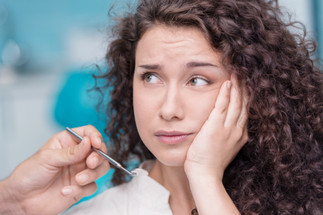Posted by Amy McGlaughlin, RDH PHDHP on Apr 12th 2018
Bruxism: What's Sleep Got To Do With It?

Grind your teeth in your sleep? Many of us don't realize we are even doing it until someone else complains about the awful racket. All along you thought you were sleeping just fine. Sadly, there could be something much more serious behind that clenching and gnashing you're doing in your sleep. There is known incidence of bruxism in patients diagnosed with obstructive sleep apnea. This link is prevalent enough that it's worth ruling out before breaking the bank on that custom laboratory-made night guard.
The current position statement issued on sleep-grinding appliances by the American College of Prosthodontists has been raising eyebrows. It suggests revamping how we've been viewing and treating bruxism. It urges careful consideration before making a night guard. The concern is that many of the appliances increase the opening of the jaws so much so that it will actually make serious sleep breathing disorders worse. This increase is called the occlusal vertical dimension (OVD). OVD is the space between the biting surfaces of the upper and lower teeth. Should a patient have an undiagnosed sleep breathing disorder, such as Obstructive Sleep Apnea, opening this space wider will ultimately make OSA worse, as it would prevent the bottom jaw from sliding forward to reopen the hindered airflow through the throat region. The ACP warns "Practitioners should screen patients for obstructive sleep apnea (OSA) prior to fabricating a maxillary (upper teeth) night guard that increases the occlusal-vertical-dimension (OVD)…" When OSA is occurring, an individual's airway is essentially collapsing. The brain will recognize a drop of oxygen levels and arouse from the deep sleep stage and send the facial muscles into action, sliding the lower jaw forward to restore airflow by reopening the airway. When this happens repeatedly throughout the night, it results in sleep grinding and all the negative effects that accompany both anomalies.
It may take some time and diligence to find a dentist and physician to refer you for the proper sleep studies. What can you do in the meantime to protect those pearly whites? You will likely want to protect your teeth and supporting structures from possible damage. Look for a quality product that will not affect your airway or bite significantly. I don't think it is necessary or wise to invest a lot of money in a custom laboratory appliance if it may not be used long-term, or at all, pending the outcome of your sleep study. An affordable, thin night guard would be an excellent choice for the interim. Look for one that offers a slim profile with added protective properties. A night guard I have found and recommended with promising feedback is the SOVA night guard. It meets the criteria for durable protection, custom fit, ease of use, and affordability while only increasing the opening of the bite slightly. SOVA will make wearing a night guard as easy as possible while you get to the "root" of your sleep-grinding.

